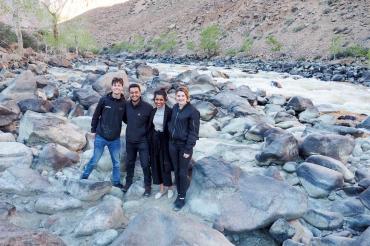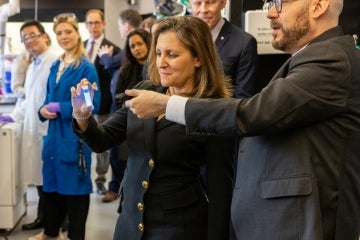U of T introduces global citizen, global scholar initiatives to promote international learning in and out of the classroom

Published: September 3, 2019
The University of Toronto wants to inspire students to seek out academic and extracurricular activities that will prepare them to tackle the challenges – and embrace the opportunities – of a globalized world.
Students can now work towards a Global Scholar designation by taking a curated set of courses offered by their program or faculty. When those courses are completed, students will receive a certificate and a “Global Scholar” notation on their transcript.
There are currently six certificate programs, but the university is looking to expand the global scholar offerings to more divisions across all three campuses.
“Each division is creating and curating its own vision of what a global scholar looks like,” says Joseph Wong, U of T's associate vice-president and vice-provost, international student experience.
Students can also work towards a “Global Citizen” designation that will appear on their co-curricular record (CCR) by getting involved in programs and activities that develop three competencies: global perspective and engagement, inclusivity and equity, and community and civic engagement. They must also complete a self-reflective workshop where they will articulate how their experiences contribute to global citizenship.
Of the 7,000 programs and activities that can appear on the CCR, 1,000 of them count toward the Global Citizen designation.
Students interested in the global citizen and global scholar programs can find information on the certificates and CCR opportunities on U of T’s global university webpage.
“One of the main objectives of the University of Toronto, as a global university, is to ensure that students have the ability and also the desire to live, to work and to interact with people anywhere in the world,” says Wong.
Students like Ben Sprenger and Rushay Naik embody this global mindset.
This past summer, they were part of a research team who travelled to Mongolia to study the impact of a local government and World Bank initiative that provides portable solar panels to nomadic herders. The trip was organized through the Reach Project, an initiative of the Munk School of Global Affairs & Public Policy, supported by the Mastercard Center for Inclusive Growth.
“It was a really eye-opening experience,” says Sprenger, a mechanical engineering student in the Faculty of Applied Science & Engineering. “Even though Mongolia is a one-of-a-kind country, the ideas from the project are pretty universal.”
The Reach Project is one of many global-focused opportunities at U of T, and both Sprenger and Naik have spent much of their time in university taking advantage of those offerings.
Naik, a Victoria College student who is double majoring in human biology and peace, conflict and justice studies in the Faculty of Arts & Science, has travelled to Greece to look at how austerity measures and the refugee crisis have affected the country’s health systems. He has also researched universal health care at Washington, D.C. think tank the Center for the Study of the Presidency and Congress, and is currently working on an independent study course on Geneva’s role in interstate war and conflict.
Sprenger is currently in the U.K. on a year-long work placement with Williams, which makes Formula One race cars, working on the company’s Formula E electric car racing series. Last year, he produced a documentary with his sister and fellow U of T student Jillian Sprenger, on Sri Lanka’s vulnerability to climate change. He has also been a part of U of T’s formula racing team, which builds formula-style racing cars and participates in competitions around the world.
For Sprenger, a global education is an invaluable way of gaining a new perspective in and out of the classroom.
“It gives a completely new frame of reference thinking about world issues, thinking about different developments you read in the news,” he says. “It provides an enormous amount of context to everything you learn.”
These experiences can also compel students to challenge their preconceived notions, says Naik.
“We come into our programs and courses with a certain understanding of how things work – the way the world works – that's borne from our experiences and our stories we take into university and our daily life,” he says. “What global experiences do is effectively test those.”
The Global Scholar and Global Citizen designations were designed with students’ futures in mind, says Wong.
“A lot of the thinking that's gone into the global scholars certificate program has been informed by employers both in the private and public sector who have told us that they are really interested in students who bring with them some meaningful curricular experience,” he says.
“This is a tremendous opportunity for our graduates to hone those skills while piquing their curiosity and encouraging them to embrace those kinds of opportunities.”


